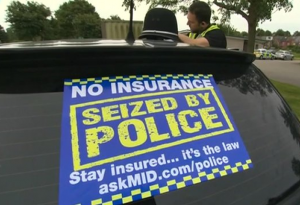Top Ten Motoring Offences
General Practice Solicitors who deal with general criminal law often aren’t fully familiar with the ideal legal arguments that can be put forward on your behalf if you have been accused of any of the road traffic offences below;
Fail to nominate driver
If you are caught committing a motoring offence, you will be sent a section 172 driver information request.
You will receive 6 points on your licence on your licence if you do not complete and return the request.
There are two primary ways to successfully defend this, Section172(4) and S172(7)(b) Road Traffic Act 1988.
You can defend this allegation if you either didn’t receive the section 172 information request to do so, or you used reasonable diligence to find out who was driving but were unable to do so.
No Valid Insurance
The law assumes you are at fault and thus guilty, irrespective of your reasons for driving without valid insurance.
When found guilty, or if you plead guilty to driving with no insurance then you will get six to eight penalty points.
Many drivers in this situation have unknowingly had their car insurance policies cancelled without being notified.
You can use a special reasons argument if you can show that you genuinely and honestly believed that you had insurance cover in place. If you are unsure what a special reasons argument is or how to use one, contact https://www.pattersonlaw.co.uk for a free, no obligation advice call and find out how to defend yourself.
Speed Limit Offences
You will receive 3 to 6 penalty points on your driving licence for speeding, plus a possible discretionary driving ban, incurred court costs for your case and a fine.
Expert testimony is increasingly important following recent UK case law if you want to be able to defend your speeding allegations.
Drink Driving Offences
The maximum breath reading for drink driving in the UK is 35mg. A twelve month driving licence disqualification is the minimum penalty for drinking and driving.
There are three legitimate defences for drinking and driving offences. You can prove that you were not the driver at the time of the offence, you can prove that you were not in a public place, or you can prove that you didn’t consume alcohol until after you had driven, rather than before.
In certain emergency situations, or if you didn’t know you consumed alcohol and were oblivious to the fact that you had done so, you may also negate a disqualification.
Drunk in charge of a vehicle
To gain a conviction, it is necessary for the prosecution to demonstrate that you were over the legal drink drive limit and that you were in charge of the car at the time of the offence.
A viable defence is to demonstrate that you were not intending to drive the vehicle until you were under the limit again.
In addition to receiving either ten penalty points on your licence if found guilty, you can also possibly receive a discretionary driving ban.
Driving with a Mobile Phone
The law says that you must be holding whilst using a phone in order to commit an offence.
The opinion of many Magistrates Courts varies widely for this offence.
A stop at traffic signals or a traffic jam is still classed as driving.
Without Due Care Offences
It is a requirement that to convict you of driving without dure care, the prosecution must prove beyond reasonable doubt that at the time in question, the level of your driving fell below those expected from a careful & competent driver.
It covers many motoring offences from bumps in car parks to undertaking on a motorway.
In some instances, rather than attending Court, the police can offer you a Driving Improvement Course.
Fail to Report
Any driver involved in an accident has a legal duty to stop and provide your details in accordance with S 170 Road Traffic Act 1988 if either; a person, another vehicle or property was damaged or injured.
You have up to twenty four hours to report an accident to the police if it wasn’t practicable to provide your details at the time of the incident.
If found guilty you will receive 5 – 10 driving licence penalty points or a discretionary ban.
You would have a legal defence if you weren’t aware that damage had been caused and you can demonstrate to the Court that it would have been reasonable that you didn’t know that you had in fact been a party to an accident.
Because both of these are viewed by Courts as really serious driving offences, you may face community service or even a custodial sentence.
Dangerous Driving Road Traffic Offences
Dangerous driving convictions require the prosecution to show that the standard of your driving fell well below the standard required. Also, it should be clear to a competent driver that the driving is dangerous.
The penalty for dangerous driving is a minimum one year driving ban, a complete driving re-test before you can get your licence back and a custodial sentence.
No licence
Much confusion surrounds this motoring offence.
Driving without having visible L plates, or driving without ever passing a driving test are two examples of endorsable offences of this type.
Should the Driver and Vehicle Licencing Agency ask that you return your driving licence to them and they suspend your entitlement, this would be non-endorsable.
A common misconception is that no licence means that your motor insurance is invalid. That is wrong.
A specialist motoring law solicitor will be able to advise you on the details of this motoring offence. Magistrates very often misunderstand this road traffic offence and whether it should carry points or not.
